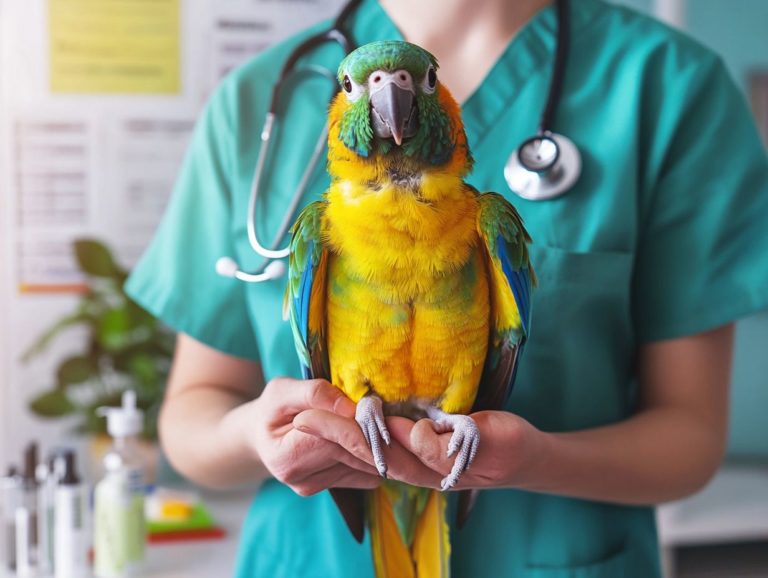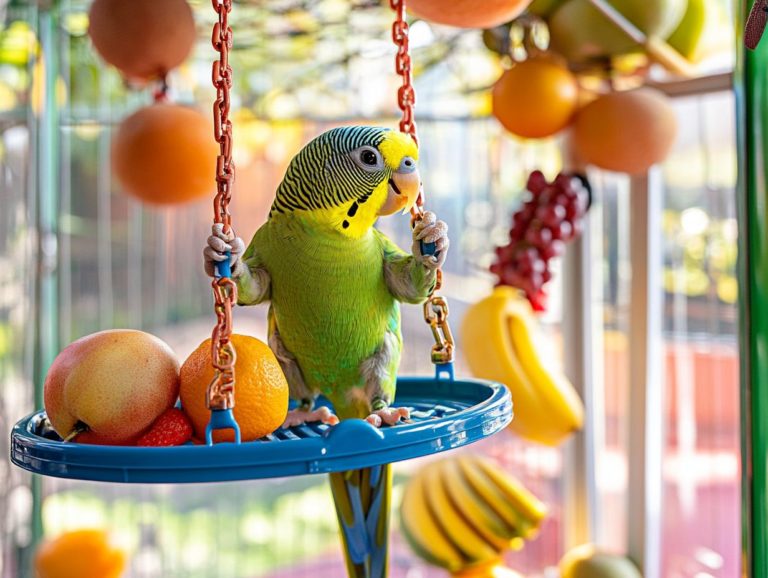5 Ways to Enhance Your Bird’s Mental Health
Birds are more than charming companions; they need mental stimulation and emotional well-being.
Like you, they can experience stress and anxiety, which may lead to health issues if ignored.
Explore five essential strategies to enhance your bird s mental health, from engaging toys and activities to creating a nurturing environment.
Learn to recognize signs of poor mental health, common challenges, and effective remedies.
Your feathered friend deserves the very best! Let’s ensure they live a happy and healthy life!
Contents
- Key Takeaways:
- 1. Provide Mental Stimulation through Toys and Activities
- 2. Create a Safe and Comfortable Environment
- 3. Encourage Social Interaction with Other Birds or Humans
- 4. Establish a Routine for Your Bird
- 5. Monitor Your Bird s Diet and Nutrition
- Why Is Your Bird s Mental Health Important?
- What Are Some Common Mental Health Issues in Birds?
- How Can You Prevent Mental Health Issues in Your Bird?
- What Are Some Natural Remedies for Improving Your Bird s Mental Health?
- When Should You Seek Professional Help for Your Bird s Mental Health?
- Frequently Asked Questions
- What are 5 ways to enhance my bird s mental health?
- Why is it important to enhance my bird s mental health?
- Can birds experience mental health issues?
- How can I tell if my bird is mentally healthy?
- Can I enhance my bird s mental health with just toys and puzzles?
- Are there any additional ways to enhance my bird s mental health?
Key Takeaways:
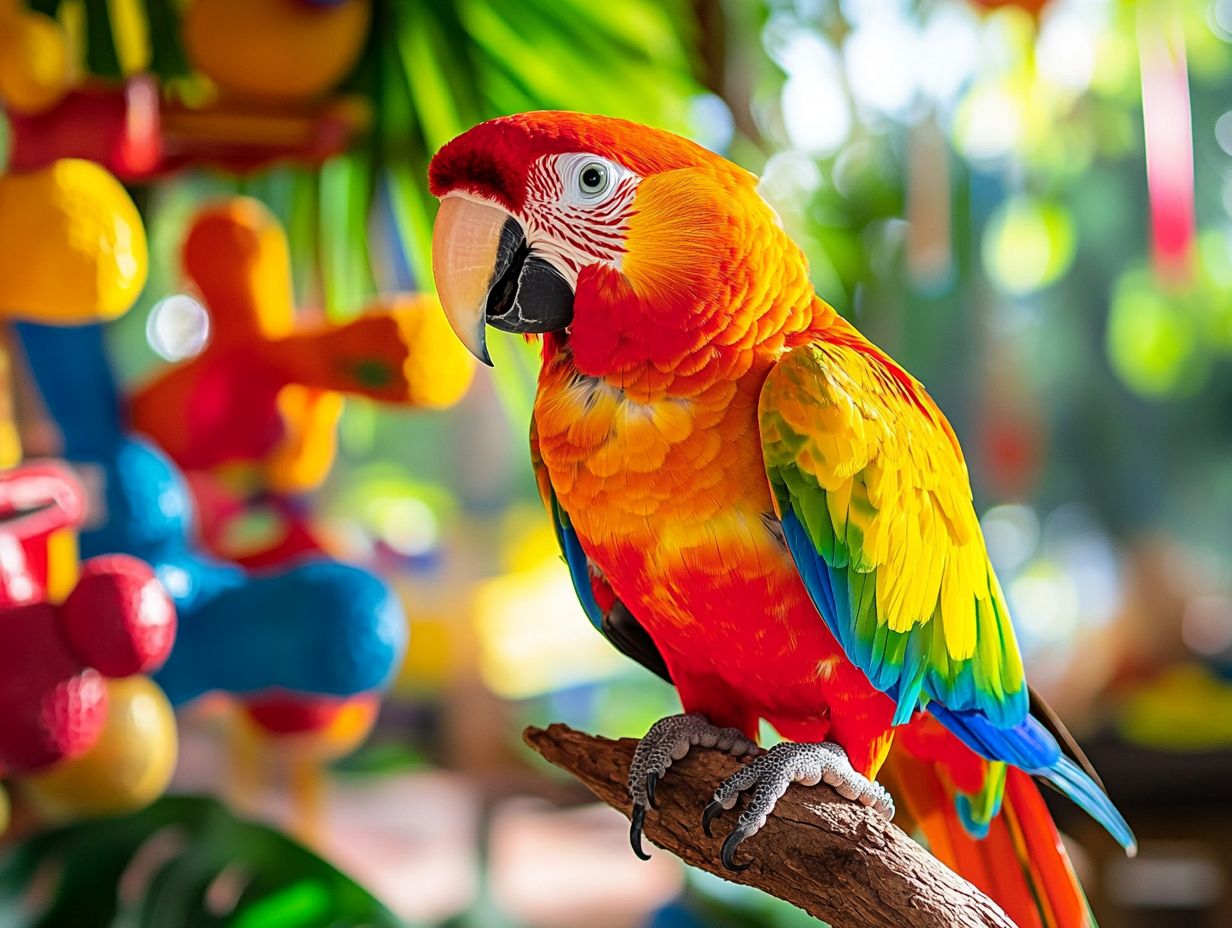
- Provide toys and activities to keep your bird active and happy.
- Create a safe, comfortable space that meets your bird’s needs.
- Encourage social interaction through playtime with other birds or humans.
1. Provide Mental Stimulation through Toys and Activities
Offering mental stimulation through a variety of toys and activities is essential for your bird’s emotional well-being. This helps reduce anxiety and stress while building trust and interaction between your bird and its environment, highlighting the benefits of enrichment for bird health.
For example, foraging toys encourage your feathered friends to seek out hidden treats, while puzzles challenge their thinking skills, providing hours of entertainment. These activities not only keep your birds physically active but also boost critical thinking.
Regular interaction with humans and socializing with other birds is crucial for developing trust and reducing aggressive behaviors. This creates a more harmonious living environment.
By providing a stimulating environment, you help your birds feel more secure and engaged, enriching their lives with positive behaviors. Consider exploring how to keep birds engaged in their cages for more tips.
2. Create a Safe and Comfortable Environment
Creating a safe and comfortable space is vital for birds, especially those with a history of trauma or anxiety. This sense of security fosters their overall health and emotional stability.
A well-designed enclosure is key to their recovery. It should have perches at various heights and include safe toys that engage their minds without risks.
Ensure the space is free of sharp edges and harmful materials to enhance a stress-free atmosphere. Reducing environmental hazards significantly lowers stress, allowing birds to acclimate, heal, and thrive as they rebuild their trust and confidence.
3. Encourage Social Interaction with Other Birds or Humans
Encouraging social interaction is essential for your bird s emotional well-being. Connecting with others alleviates feelings of loneliness and can reduce aggressive behaviors stemming from isolation.
When your bird engages socially, it experiences increased mental enrichment, which translates to improved thinking skills and greater happiness. Interaction with you, as their companion, builds trust and creates a stimulating environment that challenges their intellect.
Structured socialization practices, such as arranging playdates with other birds or joining bird clubs, can cultivate community connections that enhance their temperament and emotional state. These activities help your bird develop better coping mechanisms, reduce anxiety, and live a vibrant life filled with companionship and learning.
Start implementing these strategies today for a happier, healthier bird!
4. Establish a Routine for Your Bird
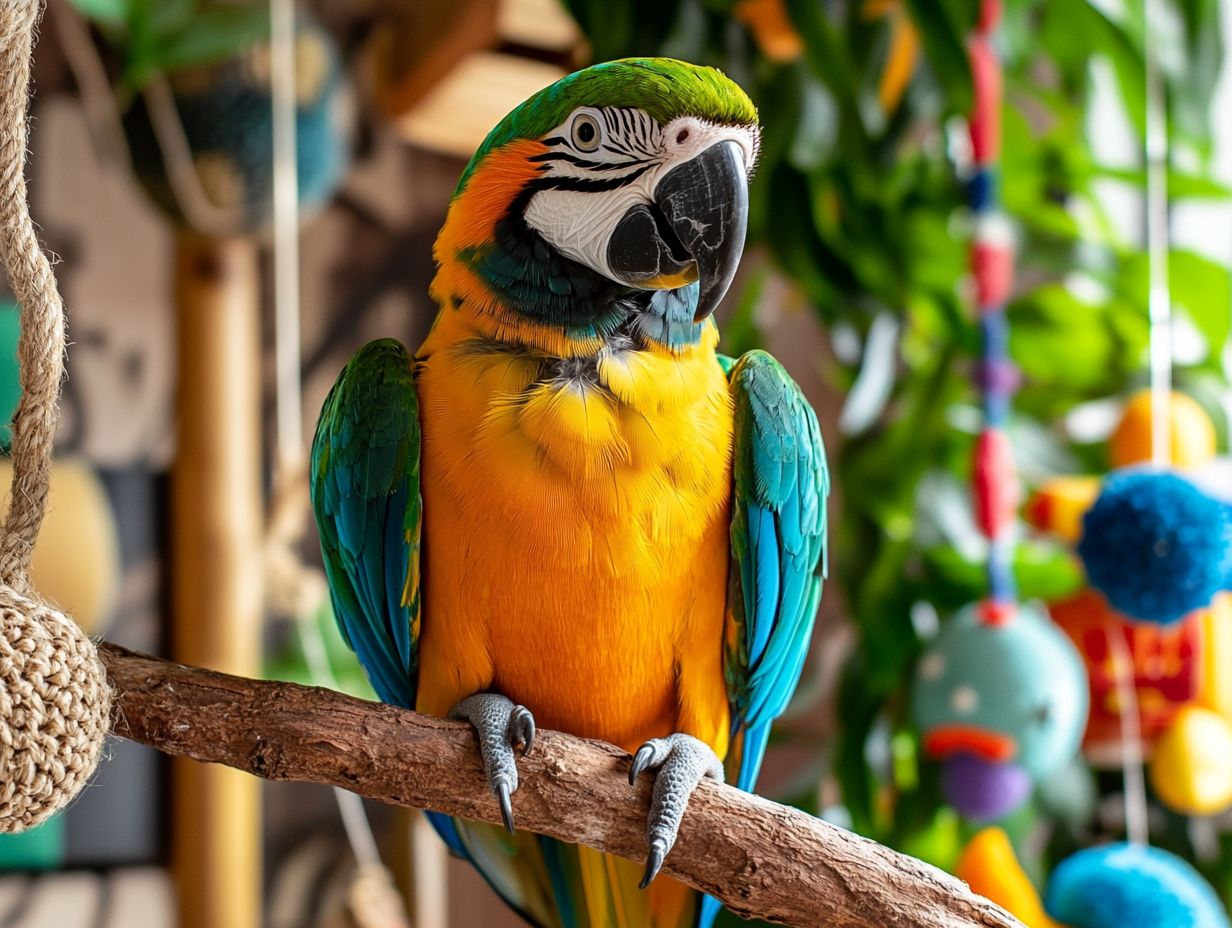
Establishing a consistent routine is crucial for your bird. It helps build trust and reduces anxiety.
A structured feeding schedule lets your bird know when to expect meals. This alleviates stress related to hunger.
Regular exercise keeps your bird physically fit and stimulates their mind. This fosters overall well-being.
Scheduled interaction periods create meaningful bonding moments. These enrich the relationship between you and your avian companion.
Consistency in these components cultivates a stable environment. Your bird will thrive, feeling safe and content.
5. Monitor Your Bird s Diet and Nutrition
Monitoring your bird s diet is essential for its well-being. A balanced diet profoundly impacts both physical health and mental state.
Include a variety of fruits, vegetables, grains, and protein sources in their meals. Don t forget vitamins A, D, E, calcium, and phosphorus.
A diverse diet meets nutritional needs and stimulates natural foraging behaviors. This encourages your bird to explore its environment.
Proper nutrition lowers stress levels. A healthy bird is more vibrant and expressive of its natural behaviors.
Why Is Your Bird s Mental Health Important?
Your bird s mental health is crucial. It directly affects their behavior, emotional stability, and physical well-being.
Neglecting mental health can lead to anxiety, aggression, or trauma-related disorders. These can seriously diminish their quality of life.
Birds show distinct behaviors when feeling mentally distressed. Signs like excessive screaming, feather plucking, or lethargy should never be overlooked.
Long-term neglect can result in chronic stress. This may cause physical issues like a weakened immune system and a shorter lifespan.
Understanding the link between mental and physical health is vital. A happy bird thrives in every aspect of life, emphasizing the need for holistic care.
What Are the Signs of Poor Mental Health in Birds?
Identifying signs of poor mental health in birds is essential for early intervention. Watch for behaviors like increased aggression and excessive vocalization.
Behaviors can differ among species. Some parrots express distress through loud squawking, while finches may retreat and stop singing.
Cockatiels might chew destructively, and canaries could withdraw from their natural behaviors. Early behavioral assessments help in recognizing these changes.
A stimulating environment and regular social interaction are key. To ensure the best care, consider following tips on how to keep your bird healthy and happy, as these can alleviate symptoms and foster healthier mental states in your avian companions.
What Are Some Common Mental Health Issues in Birds?
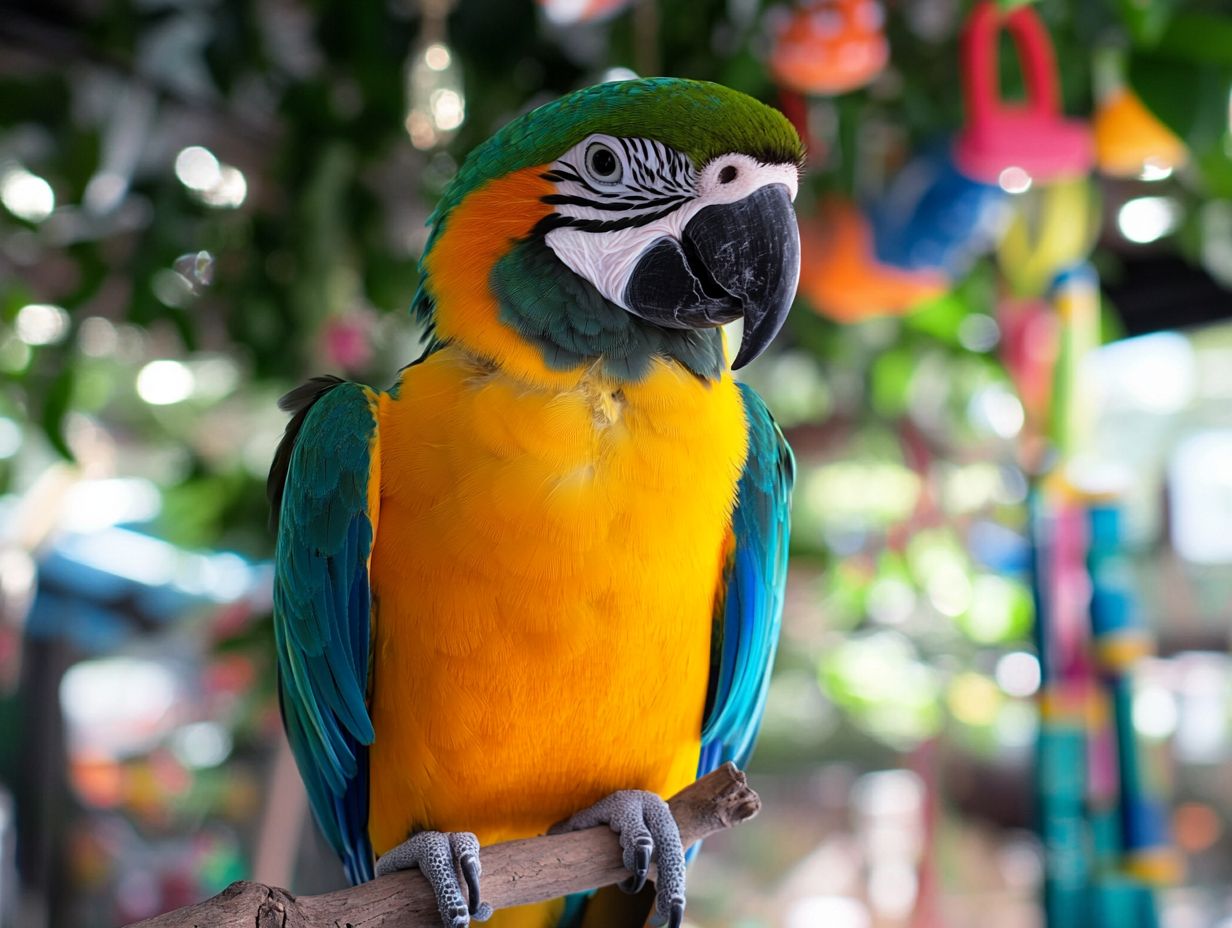
Common mental health issues in birds, such as PTSD, anxiety, and depression, often stem from trauma, environmental stressors, or a lack of social interaction. Each of these factors can lead to harmful behaviors and a decline in overall health.
Understanding these conditions is essential for you as a caregiver. It enables you to identify early signs and effectively address the underlying issues. For example, PTSD in birds might develop from sudden loud noises or aggressive encounters. This can result in symptoms like being overly alert or withdrawal.
Anxiety could present itself through excessive feather plucking or pacing, often linked to changes in their environment or routines. By recognizing these behavioral cues, you can jump in early to help your bird thrive!
Creating a supportive atmosphere nurtures the emotional and physical well-being of your birds, ultimately leading to a happier and healthier life for them.
How Can You Prevent Mental Health Issues in Your Bird?
Prevention is key to keeping your bird happy. To prevent mental health issues, you need a proactive strategy that encompasses environmental safety, fosters trust through positive interactions, and provides ample mental stimulation through engaging activities. Additionally, consider these 5 ways to make your adopted bird feel at home for a well-rounded approach.
Creating a safe living environment means minimizing potential hazards like toxic plants and sharp objects. Ensure your feathered friend has enough space to move around comfortably. Encouraging socialization with you and other birds can significantly elevate their overall well-being.
Regularly check your bird’s behavior—every moment counts! By paying attention to any changes in their habits, eating patterns, or social interactions, you can spot early signs of distress. Establishing a routine that includes interactive playtime and introducing top toys for helping birds stay active will promote mental health and keep your bird’s spirits soaring high.
What Are Some Natural Remedies for Improving Your Bird s Mental Health?
Natural remedies for enhancing your bird’s mental health include environmental enrichment, therapeutic exercises, and dietary adjustments. For detailed tips on keeping your pet bird engaged and healthy, these methods are all thoughtfully designed to boost their emotional well-being and resilience against stress.
Exploring a variety of these natural remedies can significantly uplift their overall mental state. Incorporating herbal supplements like chamomile and ginseng may promote relaxation and lower anxiety levels, leading to a more serene disposition.
Engaging in cognitive exercises, such as puzzle toys or foraging activities, can stimulate their minds and prevent boredom. To ensure your bird’s well-being, be aware of the signs your bird needs more mental stimulation. Additionally, social strategies like regular interaction with you or even other avian companions help foster vital social bonds for their emotional health.
By adopting this holistic approach, you not only meet their physical needs but also nurture their emotional well-being, ensuring a happier, healthier feathered friend.
When Should You Seek Professional Help for Your Bird s Mental Health?
Consider seeking professional help for your bird s mental health when you notice persistent signs of distress or significant behavioral changes. This is especially important when your self-help efforts simply aren t cutting it.
Pay particular attention to indicators like excessive screaming, aggressive biting, or feather plucking. These behaviors can signal deeper issues that need expert intervention. Be concerned if you observe changes in appetite, withdrawal from social interactions, or a noticeable drop in activity levels these can all point to emotional distress.
In such cases, consulting a veterinarian or a specialist in bird behavior becomes essential. They have the expertise to identify underlying conditions and recommend appropriate therapies. Therapy and rehabilitation are crucial for addressing severe mental health challenges, offering structured environments and behavioral techniques designed to enhance emotional well-being and facilitate recovery.
Frequently Asked Questions
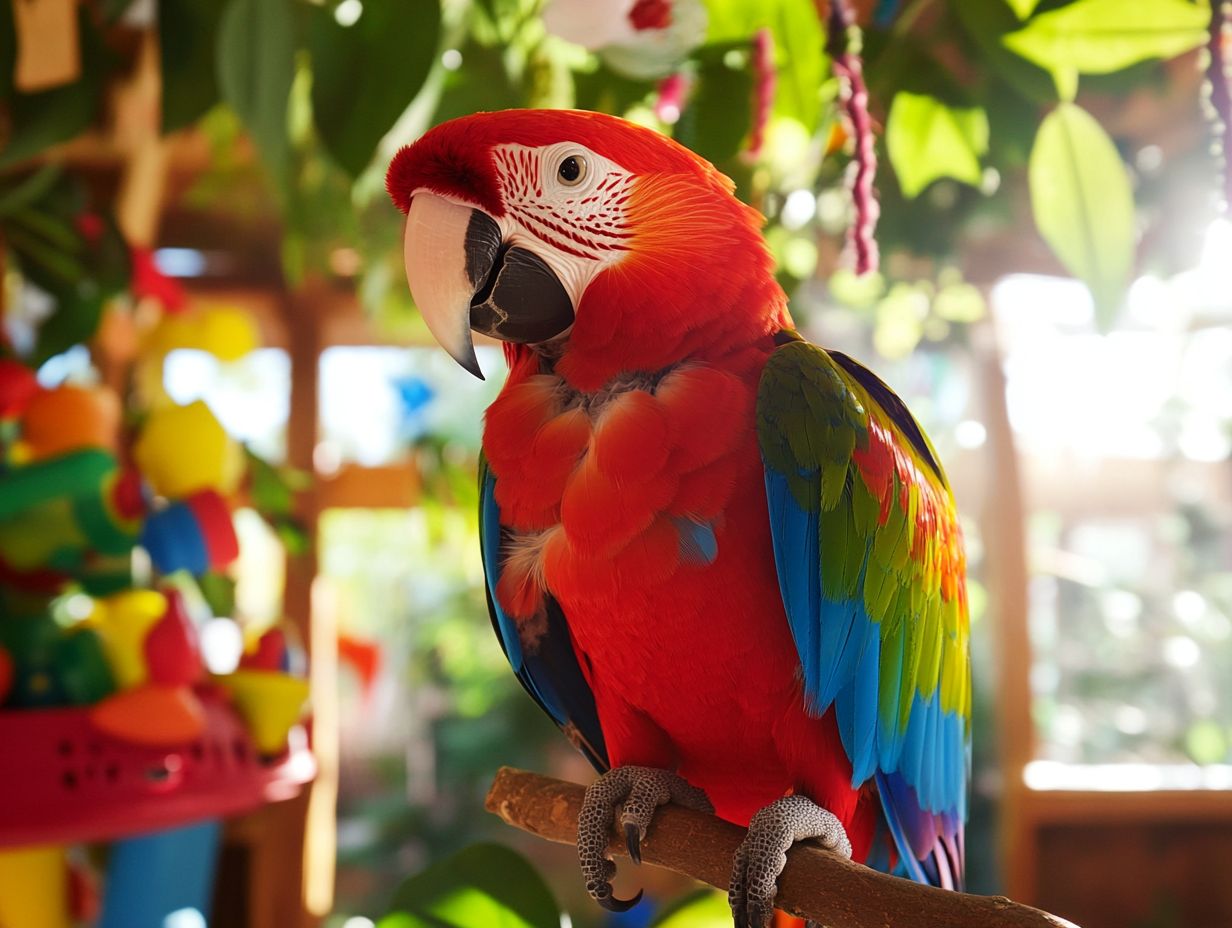
What are 5 ways to enhance my bird s mental health?
Provide mental stimulation with toys and puzzles to keep your bird s mind active.
Offer various places to sit and play in their cage to prevent boredom and encourage exploration.
Spend quality time bonding with your bird through training and social activities.
Create a consistent routine to help reduce stress and anxiety.
Ensure a nutritious diet, as good nutrition significantly impacts mental well-being.
Why is it important to enhance my bird s mental health?
A bird’s mental health greatly affects their overall well-being. Keeping your bird mentally stimulated and happy is crucial, and exploring top bird enrichment ideas can help prevent behavioral issues like feather plucking and aggression.
Can birds experience mental health issues?
Yes, birds can experience mental health issues, just like any other animal. This can happen due to a lack of stimulation, social interaction, and a suitable environment. You should take these issues seriously and seek professional help if needed.
How can I tell if my bird is mentally healthy?
A mentally healthy bird plays, explores, and sings. They also have a healthy appetite, bright and alert eyes, and sleek, smooth feathers.
If you notice changes in your bird s behavior or physical appearance, act fast and consult a vet!
Can I enhance my bird s mental health with just toys and puzzles?
No, while toys and puzzles are excellent for keeping your bird mentally stimulated, they shouldn’t be the only method used.
It’s important to provide a variety of places to sit, social interaction, and a nutritious diet to maintain your bird’s mental well-being, including implementing behavioral enrichment for parrots.
Are there any additional ways to enhance my bird s mental health?
You can also provide access to natural sunlight and fresh air, along with opportunities for exercise and play outside of their cage.
This can help improve their overall mood and mental state.

